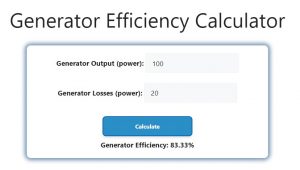About Generator Efficiency Calculator (Formula)
Generator efficiency is a crucial factor in determining the performance and cost-effectiveness of power generation systems. Understanding how efficiently a generator converts fuel into electrical energy allows users to make informed decisions regarding operation and maintenance. The Generator Efficiency Calculator provides a straightforward way to assess this efficiency, helping both individuals and businesses maximize their generator performance. This article will explain the formula used to calculate generator efficiency, provide instructions on how to use the calculator, present a practical example, and address common questions.
Formula
The formula for calculating generator efficiency is:
Generator Efficiency = (Generator Output / (Generator Output + Generator Losses)) * 100.
How to Use
- Determine Generator Output: Start by measuring the total electrical output produced by the generator, usually in kilowatts (kW) or megawatts (MW).
- Identify Generator Losses: Next, calculate the total losses incurred during the generation process. These losses may include heat loss, mechanical losses, and any other inefficiencies.
- Input Values into the Formula: Substitute the generator output and losses into the formula to calculate efficiency.
- Calculate: Perform the calculations to find the generator efficiency as a percentage.
Example
Consider a generator that has an output of 100 kW and experiences total losses of 20 kW.
- Generator Output = 100 kW.
- Generator Losses = 20 kW.
Using the formula:
Generator Efficiency = (100 / (100 + 20)) * 100
Generator Efficiency = (100 / 120) * 100 = 83.33%.
In this example, the generator operates at an efficiency of 83.33%, indicating that it effectively converts a significant portion of input energy into usable electrical energy.

FAQs
- What is generator efficiency?
Generator efficiency measures how effectively a generator converts fuel into electrical energy, expressed as a percentage. - Why is generator efficiency important?
Higher efficiency means lower fuel costs and reduced emissions, contributing to cost savings and environmental sustainability. - What factors can affect generator efficiency?
Factors include load conditions, fuel type, maintenance practices, and operational practices. - How can I improve my generator’s efficiency?
Regular maintenance, proper load management, and using high-quality fuel can enhance efficiency. - Is there an ideal efficiency percentage for generators?
While most generators aim for efficiency above 80%, optimal efficiency varies by generator type and application. - What are generator losses?
Generator losses include energy lost due to heat, friction, and electrical resistance in the system. - Can generator efficiency change over time?
Yes, efficiency can decline due to wear and tear, improper maintenance, or aging components. - How often should I calculate generator efficiency?
It’s advisable to calculate efficiency regularly, especially after maintenance or significant operational changes. - What are the common types of generators?
Common types include diesel generators, gas generators, and renewable energy generators like wind and solar. - Can I use this calculator for different types of generators?
Yes, the calculator can be applied to any generator type as long as you have the necessary output and loss data. - What is a typical generator efficiency range?
Most generators operate between 75% and 95% efficiency, depending on their design and application. - How does load affect generator efficiency?
Generators often operate most efficiently at specific load levels. Too low or too high a load can reduce efficiency. - What should I do if my generator’s efficiency is low?
Investigate maintenance issues, adjust loads, and consider upgrading components or the generator itself. - Are there regulations regarding generator efficiency?
Yes, some regions have regulations and standards that generators must meet for efficiency and emissions. - How does fuel quality impact generator efficiency?
Higher-quality fuels tend to burn more efficiently, leading to better generator performance and lower losses. - Can generator efficiency impact power quality?
Yes, inefficient generators can produce unstable power output, leading to voltage fluctuations and poor power quality. - Is there a difference between thermal and electrical efficiency?
Yes, thermal efficiency refers to converting fuel to heat energy, while electrical efficiency focuses on converting that heat into electrical energy. - What tools can I use to measure generator output?
Tools include wattmeters, power analyzers, and built-in generator monitoring systems. - Can I manually calculate generator efficiency?
Yes, you can use the provided formula and measure the necessary output and loss data manually. - What is the best practice for monitoring generator efficiency?
Implement regular performance audits and maintenance checks to ensure optimal operation and efficiency.
Conclusion
The Generator Efficiency Calculator is a valuable tool for anyone looking to assess and optimize their generator’s performance. By understanding the factors that contribute to efficiency and regularly calculating it, users can ensure they are operating their generators at peak performance. Improved efficiency not only leads to cost savings but also contributes to a more sustainable energy future. Regular monitoring and maintenance can further enhance generator efficiency, making it a vital aspect of effective power generation management.
